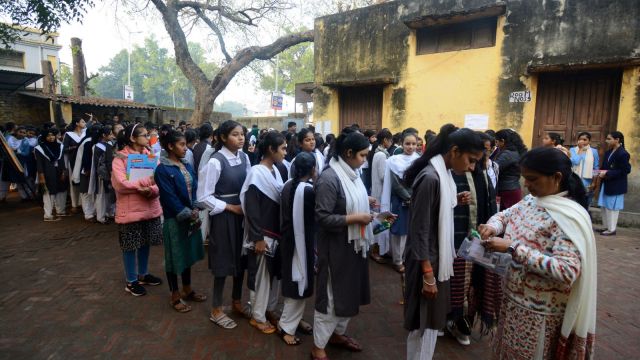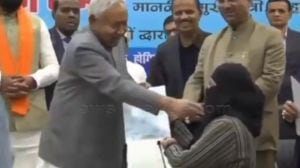CBSE Class 10 Social Science Exam: Chapters breakdown, ways to write answers
CBSE Class 10 SST board exams: Certain topics have consistently been emphasised, focusing on these areas can enhance preparation. Here's a breakdown of the frequently asked topics across the four subjects:
 On the last day, the focus should be on quick revision rather than a detailed study. Key concepts, keywords, and frequently asked questions need to be practised thoroughly.(representative image/express photo)
On the last day, the focus should be on quick revision rather than a detailed study. Key concepts, keywords, and frequently asked questions need to be practised thoroughly.(representative image/express photo)–Pratik Jadhav
CBSE Class 10 Social Science Exam: As the Class 10, social science examination will be held on February 25, students must be worried what are some of the topics across the subject that are crucial for scoring marks. If you are feeling the same then, we are here. indianexpress.com spoke to a social science teacher who then helped us to know which are the topics which are most asked in the SST.
CBSE Class 10 Social Science Exam: Most asked topics in the subject?
In the CBSE Class 10 SST board exams, certain topics have consistently been emphasised due to their significance in the curriculum. Focusing on these areas can enhance preparation and boost your confidence. Here’s a breakdown of the most frequently asked topics across the four subjects:
History
Chapters like Nationalism In India, and Rise of Nationalism In Europe are important. Questions on Satyagrahas by Mahatma Gandhi, Non-cooperation Movement, Civil Disobedience Movement etc should not be left. Additionally, the Unification of Germany, and Italy, and the Impact of the French Revolution on rest of the Europe are a must.
Geography
Water Resources, rainwater harvesting and agriculture are usually asked for MCQ or 2-mark questions.
Political Science
Chapters like Political Parties, and Federalism with topics like challenges to political parties, reforms to strengthen the parties, functions of political parties, majoritarianism, accommodation, and language policy are important topics.
Economics
Chapters like Money and Credit, Sectors of the Indian Economy, with topics like Formal and Informal Sources of Credit, SHGs, Growth of the Tertiary sector over the years, and comparison between primary, secondary and tertiary sectors are important.
CBSE Class 10 Social Science Exam: What to revise on the last day?
On the last day, the focus should be on quick revision rather than a detailed study. Key concepts, keywords, and frequently asked questions need to be practised thoroughly. The following strategies can be implemented –
–Thorough reading of NCERT key points, keywords and mind maps of each chapter which u can get in any reference book.
–In subjects like history make self-notes and focus on the cause-effect relationships. For example, why was CDM launched, what were the effects, and why was it called off??
–Do not spend too much time on maps. Follow the maps given in CBSE curriculum which you can find on the official CBSE website.
–For 2 marks of history maps, only the Nationalism in India chapter needs to be studied. The remaining 3 marks of geography, focus more on the Lifelines of the national economy as it’s a special chapter for maps.
–For civics memorise 2-3 points of each topic to write detailed answers.
–Mind maps really help study the economics chapter in quick time.
–Revise your handwritten notes. Do not focus on learning something new, instead focus on the topics you already know.
CBSE Class 10 Social Science Exam: How to write answers?
–During the exam, answer written in points is always encouraged as compared to answers written in paragraphs. Use a pencil to underline keywords. Use headings and subheadings in long answers.
A well-structured answer with key points, underlined words, and a neat presentation always ensures better marks even if your content isn’t perfect.
CBSE Class 10 Social Science Exam: How to handle difficult/confusing questions?
–Read the question carefully. If the question asks to describe then focus on writing facts, if it asks to analyse then provide reasoning.
–Keep smart answering techniques, do not overwrite. Keep a pointwise and detailed explanation of the answer.
–To avoid confusion, breaking down the question can help. For instance,Who, What, where and why of the question?
–To answer difficult questions, always start the answer with the introduction in which you write what you know about that particular topic. After the main answer don’t forget to write the conclusion as it will ensure some additional marks.
–Instead of keeping the answer blank, write something relevant. Don’t be stuck on difficult questions for a long time. Rather, move ahead and solve the easy ones first.
Jadhav is Class 10, Social Science Teacher, Global Indian International School, Balewadi, Pune
- 01
- 02
- 03
- 04
- 05































